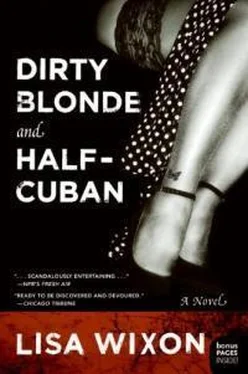Lisa Wixon - Dirty Blonde and Half-Cuban
Здесь есть возможность читать онлайн «Lisa Wixon - Dirty Blonde and Half-Cuban» весь текст электронной книги совершенно бесплатно (целиком полную версию без сокращений). В некоторых случаях можно слушать аудио, скачать через торрент в формате fb2 и присутствует краткое содержание. Жанр: Современная проза, на английском языке. Описание произведения, (предисловие) а так же отзывы посетителей доступны на портале библиотеки ЛибКат.
- Название:Dirty Blonde and Half-Cuban
- Автор:
- Жанр:
- Год:неизвестен
- ISBN:нет данных
- Рейтинг книги:4 / 5. Голосов: 1
-
Избранное:Добавить в избранное
- Отзывы:
-
Ваша оценка:
- 80
- 1
- 2
- 3
- 4
- 5
Dirty Blonde and Half-Cuban: краткое содержание, описание и аннотация
Предлагаем к чтению аннотацию, описание, краткое содержание или предисловие (зависит от того, что написал сам автор книги «Dirty Blonde and Half-Cuban»). Если вы не нашли необходимую информацию о книге — напишите в комментариях, мы постараемся отыскать её.
Dirty Blonde and Half-Cuban — читать онлайн бесплатно полную книгу (весь текст) целиком
Ниже представлен текст книги, разбитый по страницам. Система сохранения места последней прочитанной страницы, позволяет с удобством читать онлайн бесплатно книгу «Dirty Blonde and Half-Cuban», без необходимости каждый раз заново искать на чём Вы остановились. Поставьте закладку, и сможете в любой момент перейти на страницу, на которой закончили чтение.
Интервал:
Закладка:
Pedrin stands up, a bit too fast, and hurls U.S. dollars on my desk.
“Vaya con dios.”
La yuma,I’d later learn, was originally slang for the United States, and una yumaidentified a norteamericano.The word was derived from old western films where the township of Yuma, Arizona, played a character, such as The Wild Bunchor 3:10 to Yuma.Today, yumameans any foreigner, from any country. And it’s especially used to indicate a naïve tourist who assists—unwittingly or not—a Cuban in his daily quest for dollars.
AT THE END of the night, Blanca says that what I’ve heard is not unusual. She explains that Cubans are paid only in pesos, but that most necessities can only be bought in dollars, at dollar stores open to Cubans.
In the dual economy, the pesos are nearly worthless.
“So if everyone is paid in pesos,” I ask Blanca, “but most things are sold in dollars, how are people supposed to get dollars?”
“Each day we wake up, mi amor,to answer just that question.”
Later in the evening, Camila tells me that remittances sent from abroad are the island’s biggest source of income.
“More than money from tourism?” I ask. “Or cigars?”
She nods, and pulls the night’s dinner from the 1940s rust-bucket fridge. “It’s not just the families who’ve left for Miami. Cubans marry foreigners and then move to Europe or Canada and send money home.” Camila arranges black beans and salted tomatoes on a plate and then, quietly, says, “And if you’re Cuban with a yumaboyfriend or girlfriend, they send money here as well.”
“If you don’t have anyone to send money?”
“There’s free education, free health care, and those with houses don’t pay rent. There’s also a libreta,which gives us enough food to get us through the first few days in the month. The rest,” she says, patting her stomach, “we have to inventarin some other way.”
As she heats my dinner in a microwave, I chew on my lower lip. Camila doesn’t have any family abroad. Her job as head of the prestigious Instituto brings in the peso equivalent of $32 a month. Though four times the average $8 Cuban salary, it’s hardly enough for basics.
Yet the signs of dollars are everywhere in her home. A color TV, a stereo, beautiful clothes.
I don’t dare ask where it comes from.
13
T he first timeI noticed Walrus was my eleventh trip to the diplomercado.First, I saw him in the aisles, tugging at his mustache, and then later, watching Mario and me load goods in the back of the Studebaker.
By that trip, I’d made enough money for a month’s rent, and Camila and I had celebrated the night before with a bottle of rum we shared on the seawall, the Malecón. In a city where no one has enough space, the long, concrete couch on the bay has become Havana’s living room.
“I think this whole diplobusiness,” I said cheerily as a parade of transvestites wobbled by on pavement slick with sea spray, “is the answer to my prayers.”
Turns out I’d been imploring the wrong gods.
On my twelfth trip, the July sun is overhead, and the ocean carries no breeze. At a corner near the exit of the diplomercado,Mario obsessively wipes the Studebaker’s wraparound rear window. I struggle with boxes and bags, squinting through flashes of sun on metal. I call for Mario. He heads toward me. From a distance comes a strange whistle. A signal. I look around, scanning for the source, but see none.
Mario, without looking, stuffs his buffer in a pocket, cranks the engine, and roars off, the muffler dragging behind like cans on a wedding car.
I turn to see Walrus standing next to me. “The only thing slick about that,” says Walrus, pointing at Mario’s car, “are the tires.”
Pasty white with shocks of thick brown hair and a large, unwieldy body, Walrus studies me. Knotted rope loops through his pants, and sweat mars his white shirt. Quickly, I hail a cab.
I’m pushing the last bag into the taxi’s trunk when his wrist lands on my neck.
“Staff says you’ve been in the diplomercadoevery day this week. Using a U.S. passport. That true?”
“Who’s asking?” I shake off his hold and slide into the cab.
He points at the trunk. “Are you setting up house here, princesa? ’Cause if so you’ve got enough for a castle.”
I refuse to answer. The Walrus smiles, motions for the cabbie to wait, and lights a Popular cigarette—unfiltered Cuban tobacco that lets out a brume of smoke. Walrus leans into the car and sneers. I can smell his lips.
“Careful here, princesa.”
BLANCA DOESN’T ANSWER the door or return any calls. The Studebaker is nowhere in sight, so I stash the purchases at Camila’s house. A few nights later, Mario cautiously turns up, and we make the deliveries.
“It’s just freaking rice cookers,” I say. “You’d think I was dealing opium.”
“You must have a Chinaman walking behind you,” says Mario.
“A Chinaman walking behind me?”
“It’s a saying. Means bad luck. The fat cop is singando”—fucking—“with you. Happens to all of us, sooner or later.”
“How lucky. What kind of cop is assigned to the Advil aisle, anyway?”
Mario taps two fingers to his shoulder blade, to indicate the dual stripes of a military uniform.
“G-2. Security police,” he says somberly. “What you don’twant are those chotoswalking behind you.” We glide through a crowded intersection, and Mario bangs on the rooftop in thanks. Dangling from his rearview mirror are a rosary of beads and bones and shells to ward off bad spirits. In the back window, he hangs blank CDs, because he swears it deflects the other evil—police radar.
“Why would the G-2 follow me?” I ask. “Because I’m the child of a Yankee diplomat?”
“Mira,if you’re going to live in Cuba and you’re a norteamericano,you’ve got to accept you’re going to be watched. Almost all long-term foreigners are watched. No importa.The G-2 were trained by the Russians, but now—now they’ve got nothing better to do than follow around pretty, young girls,” he says with a laugh. Then, with a roll of his eyes, says: “Or anyone who’s a risk to the ‘triunfo de la revolución.’”
The Studebaker stalls at a light. At a corner café, an elegant, dark-skinned woman in a nurse’s outfit waits for a tourist family to finish eating before snatching the chicken bones from their plates and hurrying away with her prize.
El triunfo de la revolución.
The triumph of the revolution.
When I first arrived in Cuba as an adult, I was overcome with the beauty of its people, with the quick smiles and kindness, the motivation and the overt intelligence. After I spent my childhood traveling through impoverished territories, the education and health and optimism of Cubans impressed me. I’m still impressed. But what I didn’t expect was to feel that each day I saw a rawer, more truthful kind of Cuba. And I hoped that this onion, unpeeling in gossamer layers before my eyes, would not reveal itself to be rotten at the core.
14
N ick Wethersby isa high-class private investigator and European mystery man who now makes his living snooping on a rich foreigner’s Cuban love interest. Word on the street is that he’s hiding out in the Pearl of the Antilles because U.S. authorities have a warrant on his head. In this last, dark corner of the earth, chances are he’ll escape detection.
In a camel’s-hair shirt and linen pants, Nick sports the prematurely wrinkled face of someone who’s spent too much time on other people’s yachts. In Cuba, he plies his trade on the black market and lives with his Cuban wife in Guanabo, a beach town outside Havana.
“When foreign lovers are the biggest source of income for lucky Cubans, anyone who interferes with that relationship is in danger,” Nick says, pulling up a chair for me on his patio overlooking the waves. “I can’t lie to you, yours is a risky task.” He drops a hand on my knee.
Читать дальшеИнтервал:
Закладка:
Похожие книги на «Dirty Blonde and Half-Cuban»
Представляем Вашему вниманию похожие книги на «Dirty Blonde and Half-Cuban» списком для выбора. Мы отобрали схожую по названию и смыслу литературу в надежде предоставить читателям больше вариантов отыскать новые, интересные, ещё непрочитанные произведения.
Обсуждение, отзывы о книге «Dirty Blonde and Half-Cuban» и просто собственные мнения читателей. Оставьте ваши комментарии, напишите, что Вы думаете о произведении, его смысле или главных героях. Укажите что конкретно понравилось, а что нет, и почему Вы так считаете.












